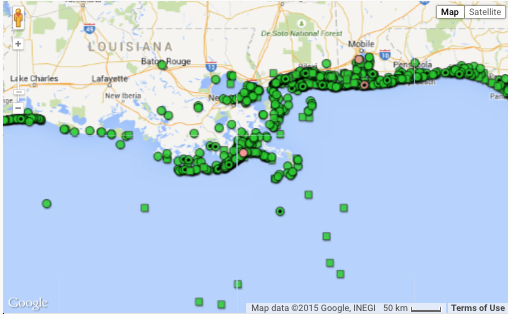
Transmitting news and information about sustainable endeavors in Coastal Virginia and beyond. Updated Weekly.
|
Gulf Oil Spill Implicated in Dolphin Die-Off
Posted 20 May 2015 by Carol Brighton
Two summers ago beach-goers and residents up and down the East Coast were disheartened as an alarming number of reports on dolphin strandings dominated local news broadcasts. The beloved mammals that frequently frolic along shorelines were particularly hard hit in Virginia. Over a 21 month period, 424 strandings were reported in the Commonwealth alone. As devastating as the epidemic was, the likely cause, a morbillivirus, appears to be dissipating, at least in the mid Atlantic.
The same malady, however, is not thought to be responsible for another ongoing die-off in the Gulf of Mexico. Instead, scientists are linking the unusual mortality event (UME) in Gulf dolphin populations directly with the Deepwater Horizon disaster. With a growing body of evidence, the latest in a series of scientific studies investigating the stranding phenomena was released today in the peer-reviewd Journal PLOS ONE. “These studies have increasingly pointed to the presence of petroleum hydrocarbons as being the most significant cause of the illnesses and deaths plaguing the Gulf’s dolphin population” says Dr. Teri Rowles, head of NOAA’S Marine Mammal Health and Stranding Response Program.
Given the timing, location, and nature of life threatening abnormalities discovered, 22 accomplished scientists on the research team were unable to establish any other feasible cause for the casualties. The highest rates of bottlenose dolphin strandings coincide with the geographic footprint most impacted by the oil spill. The occurrence of unusual lesions in the lungs and adrenal glands swelled in specimens found around heavily oiled waters. These lesions are consistent with petroleum product exposure observed in other mammals. Bacterial pneumonia was prevalent and almost certainly resulted from some of the worst lung lesions ever observed by the team's veterinary pathologist, Kathleen Colegrove. In a third of stranding cases stretching from Louisiana to Alabama, adrenal damage was evident. According to Dr. Stephanie Venn-Watson, the study’s lead author and veterinary epidemiologist at the National Marine Mammal Foundation, “animals with adrenal insufficiency are less able to cope with additional stressors in their everyday lives and when those stressors occur, they are more likely to die.” Half of the recovered specimens examined with adrenal lesions showed no other signs of injury or illness.
As crews work to clean up oil spilled yesterday from a pipeline rupture along the California coast, Virginia legislators are pushing for offshore drilling. The Governor, Senators Kaine and Warner, Representative Scott Rigell and Mayor Sessoms of Virginia Beach have come out in of support of oil exploration off the coast. Meanwhile, the Virginian-Pilot reports that the Virginia Beach Restaurant Association, the Virginia Beach Hotel Association, the VB city Resort Advisory Commission have all weighed in against oil development.
To follow more news posted on this topic, check out Pinterest.
Check the Archive for Previous Posts
All Rights Reserved. Disclaimer.


